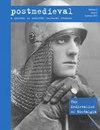叙事如劳姆沙赫:时间、空间和语言中的卡利拉和迪姆纳
IF 0.3
3区 社会学
Q4 CULTURAL STUDIES
Postmedieval-A Journal of Medieval Cultural Studies
Pub Date : 2022-12-01
DOI:10.1057/s41280-022-00253-z
引用次数: 1
摘要
本文章由计算机程序翻译,如有差异,请以英文原文为准。
Narration as Raumschach: Kalila and Dimna in time, space and languages
求助全文
通过发布文献求助,成功后即可免费获取论文全文。
去求助
来源期刊
CiteScore
0.80
自引率
25.00%
发文量
20
期刊介绍:
postmedieval publishes theoretically driven scholarship on premodernity and its ongoing reverberations. Contributions are characterized by conceptual adventure, stylistic experiment, political urgency, or surprising encounter. The editors are committed to expanding the fields of knowledge and geography represented in the journal, by showcasing scholarship that reaches across disciplines, language traditions, locales, modes of inquiry, and levels of access. Our aim is to facilitate collaborative, ethical, and experimental engagements with the medieval – with its archives and art, its thought and practices, its traces and its enduring possibilities.
In general, postmedieval is published four times a year. Some of these are themed, guest-edited issues; others are open-topic. The journal’s editors will consider submissions of individual essays as well as proposals for themed issues. If accepted, individual essays will be published as Online First publications, appearing first as independent articles on the journal website and later in one of the print issues. We will also entertain small, themed clusters of essays to be included in open issues as well as commissioned book-review essays.

 求助内容:
求助内容: 应助结果提醒方式:
应助结果提醒方式:


